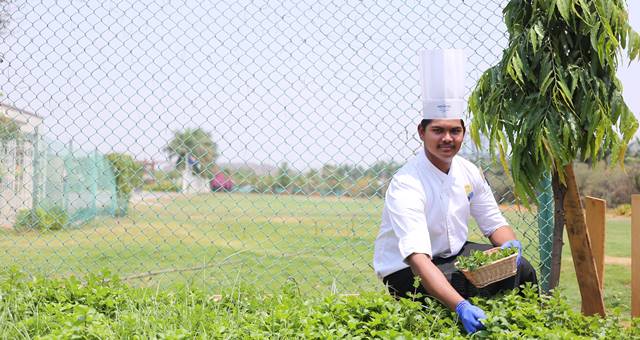AccorHotels, which is present in 1,700 cities worldwide, has committed to developing urban farming and to planting 1,000 vegetable gardens by 2020.
Though just a few months have passed since this commitment was announced, over 500 vegetable gardens have already been planted worldwide, from Bangkok to Rome and Sao Paulo to Kinshasa.
Hotels like The Sebel Kirkton Park Hunter Valley is setting new standards for local production and sourcing. The hotel now sources up to 30% of its menu from the hotel’s 70-acre grounds and vegetable garden, with a further 50% from local partners. The Sebel has an agreement with a local farmer who manages cattle and pigs on the hotel’s grounds. The livestock is processed at a local abattoir ensuring that the full process remains local.
At The Sebel Kirkton Park, the emphasis is placed on creating menus that are ever changing to reflect the season produce. The hotel’s Executive Chef regularly runs education tours of the vegetable garden for guests, providing an opportunity for guests to engage in a full sensory experience, picking their own dinner ingredients and building their understanding of nose to tail cooking and the steps from paddock to plate.
In Paris, AccorHotels has signed the city’s “Objectif 100 hectares” Charter which sets out to create 100 hectares of green walls and roofs in the French capital, including 33 hectares dedicated to urban farming.
38 hotels in 13 countries are already using connected solutions to fight food waste in their kitchens and restaurants. The initiative has cut food waste by nearly 60% in the pilot hotels’ kitchens. That’s a total of $772,000 in estimated annual savings.
Novotel Brisbane has partnered with LeanPath, a leader in technology to fight food waste, to install a connected solution in its kitchen that weighs food before it is put in the bin. After using the device for a month, the 296-room hotel has reduced its food waste by 50% and saving up to $400 a week.
In 2017, the Group plans to launch the wide-scale deployment of these devices and implement a system to monitor the results obtained in all its hotels worldwide. In Australia, this initiative has the potential to change the practices of up to 170 food outlets national that serve seven million meals each year.
Targeting food waste that can’t be avoided, 12 Australian hotels made donations to OzHarvest in Queensland, New South Wales and Victoria. During 2016, 6,390kgs of food, equal to 19,170 meals were donated by the hotels. A number of hotels also supported OzHarvest activities by providing access to their commercial dishwashers to clean food collection containers that are distributed to donors.
One of Planet 21’s two priorities is to achieve carbon neutral buildings. In 2016, the Group cut its energy consumption by 2.4% and CO² emissions by 3%. These results are even more encouraging because they were achieved despite particularly unfavorable world weather conditions in 2016 compared with 2015 since demand for heating and air-conditioning increased more than 4%.
In France, the construction of the JO&JOE Paris establishment will kick off in September 2017. It will be the first Low Carbon labelled hotel and shape the way for hotels going forward. In the same vain, the new build Sofitel Sydney Darling Harbour part of the new International Convention Centre precinct will target an industry leading Green Star Sustainability Rating. The ratings will establish Sofitel Sydney Darling Harbour’s credentials as both one of the most luxurious and sustainable hotels in Australia.
Australian hotels nationally have been expanding their use of solar photovoltaic system. During 2016, the network installed more than 2MW of solar, helping to reducing the carbon footprint of hotels nationally.
This year, the AccorHotels establishments’ annual Earth Day event, “Planet 21 Day”, will see exceptional mobilisation around the theme of food and beverage. The hotels are invited to highlight their greatest achievements in three categories: the fight against food waste, the creation of an urban vegetable garden and the offer of healthy, local food and drink. The winners will be selected by a vote on the social networks. For the first time, guests and internet users will be able to elect the “greenest” hotel.
A year ago, AccorHotels unveiled its new, ambitious CSR commitments for 2020. The Group’s sustainable development program, Planet 21, focuses on four fields of action, namely employees, guests, partners and local communities, as well as two priority issues, food and sustainable buildings.


